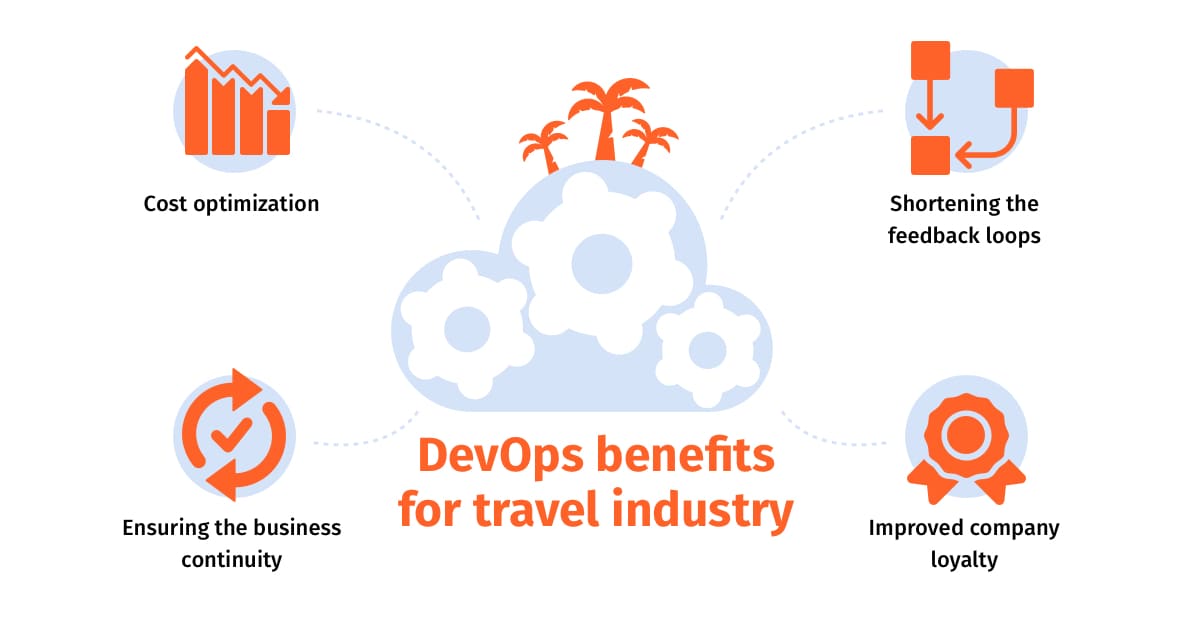How DevOps is transforming the travel industry
-
8555
-
0
-
2
-
0
There are various reasons for implementing DevOps in travel industry, cost-efficiency, performance optimization and business continuity being one of the main. Here is how this can be done.
Travel industry is one of the biggest consumers of technology and innovation. It evolved much over the last 2 decades. From call centers, where the company representative had to check the fare prices in print and consult the customers over the phone the travel moved to price aggregators like Kayak.com, which make API calls to various registers and provide convenient price comparison within a web or mobile app. The background of such operations, however, is a costly process involving using complex mainframe workloads on dedicated server data centers.
The hardest part of this evolution was the need to adapt quickly to the rapidly evolving customer requirements. Using the example above, 20 years ago the travel agency customers were content with calling a ticket booking company of their choice and letting the agent check the available tickets. Nowadays, people prefer using the price aggregator apps, which gather the data from multiple companies to form a list of available offers. This way, booking a complete set of flight, ship or train tickets, hotel rooms, car rentals and sightseeing tours for a journey can all happen within a single app in several minutes, not with multiple companies over a long time.
However, every travel business had to solve this task differently, and each of them ended up with a different IT infrastructure, composed of various proprietary systems and bespoke modules, each operating in their unique way. The worst result is the excessive complexity and cost of such operations. This is why practically every company in the travel industry is actively seeking for new ways of simplifying and decreasing the cost of their IT operations. DevOps approach to software and operations delivery is the right choice for that purpose.
DevOps: the way to do more while spending less
What is DevOps, actually?
Devops is an umbrella term for a set of cultural practices, DevOps tools, skills and workflows aimed at increasing the stability and performance of operations, while lowering the time and money costs through automation and waste elimination.
Let’s analyze every part of this definition:
- DevOps is a set of cultural practices. DevOps culture is a tectonic shift from Waterfall software delivery lifecycle with the mantra of “throw the code over the wall to be someone else’s concern” to a collaborative approach where the Devs and the Ops design the future software together. This communication results in an efficient collaboration, so the Devs know how their software will operate in production and plan the resource usage and app structure (monolith, microservices or serverless) beforehand.The Ops know what underlying IT infrastructure will be needed and build this Infrastructure as Code (IaC) in advance, along with automated Continuous Integration / Continuous Delivery (CI/CD) pipelines, thus greatly shortening the time to market for new products and product features.
- DevOps engineers use DevOps tools. DevOps approach to IT infrastructure management differs greatly from manual server provisioning and configuration, which are the characteristics of many travel platform IT workloads. DevOps engineers operate bare metal servers, virtual machines in on-prem clouds like OpenShift or virtual servers in public or private clouds like AWS or Azure, GCP or DigitalOcean. This is done by leveraging multiple proprietary or open-source DevOps tools like Docker, Kubernetes, Terraform, Jenkins, Ansible, Zabbix, Prometheus+Grafana and others. Using this toolset helps automate most of the processes and build error-proof automated workflows.
- DevOps is centered at automation and waste elimination. DevOps methodology of efficiency optimization requires significant reduction of executive control over multiple aspects of operations. Thus said, the engineers don’t have to wait for multiple approvals during the server provisioning and configuration cycle. To say even more, the managers do not have to worry about the result of the process, as it is performed by automated tools according to easily configurable Terraform or Kubernetes manifests. This way the repetitive operations are automated, leaving no room for human error and costly reconfiguration.
These core principles of DevOps allow companies of all size to undergo their digital transformation and gain a competitive edge by reducing their operational expenses, shortening the feedback implementation time and increasing their platform performance,
How can travel industry benefit from DevOps?
The core DevOps benefits for enterprise travel industry were mentioned above several times, so we will briefly list them below for convenience:
- Cost optimization. Transition to DevOps workflows begins with performing an audit of the existing IT infrastructure, as well as the tools and processes in place. Quite often this audit, along with receiving the input from the company stakeholders allows to identify the system bottlenecks and weak elements of the service delivery chain. Later, the results of this inspection lead to designing new system structure, which is always more cost-efficient. This allows to greatly reduce the expenses, both in computing resources and human effort required to deliver value to your customers.
- Shortening the feedback loops. The customers expect the products they use to respond to their preferences and expectations. If some feature is needed, it has to be developed in a couple of months at most, or the customers will swap to a competitor providing this feature. Therefore, implementing customer feedback and rolling out new features is an essential component of long-term success for any business, and travel industry is no exception.When all the routine parts of the software development process are automated, developing new features is greatly shortified. When any developer can execute a command written by a DevOps and spin up the build server, testing server, staging server and roll the update into production through a micropatch, in-app update on reboot or a rolling update across the platform — feedback loops become much shorter.
- Ensuring the business continuity. There are multiple IT infrastructures out there, and none of them are perfect. Server downtime can happen due a multitude of various reasons, so the question is not whether it will happen or not. The question is — how will your IT team ensure the business continuity once the things go awry?Monitoring accounts for around 50% of DevOps activities. However, DevOps tools like Zabbix, Prometheus+Grafana and ELK stack enable predictive and prescriptive analytics, smart alerting, detailed logging and in-depth efficiency analysis. Thus said, instead of dealing with the results of the crash, employing DevOps monitoring toolkit to avoid the downtime altogether. In addition, the practice of rolling updates allows to decrease the amount of errors during release 7 times, according to the latest researches on the state of Devops adoption in 2018 from Dora, Puppet and Atlassian.
- Improved company loyalty. DevOps culture is not centered on achieving business goals over the heads of fired employees. It accepts failures and teaches to be ready to minimize their impact, instead of finding the ways to blame somebody else. A system error is perceived not as somebody’s fault, but as an indicator of a room for improvement for the system and a chance to learn and grow professionally for the team. This way, the team members are more confident and satisfied with their job, which results in greater company loyalty and dedication.
These all might sound great and useful, but are there any real examples of how travel industry companies gained from adopting the DevOps approach to doing business? Of course!
Real-life examples of successful DevOps implementation in the travel industry
Below are three use cases illustrating how the use of DevOps practices and tools helped enterprise travel companies improve their services.
Case 1: Building an on-prem cloud for one of travel industry leaders
Amadeus is one of the largest travel operators worldwide. Their systems interact with 90% of all travel-related transactions, serving more than 700 airline companies and around 600,000 hotels, processing more than 55,000 operations per second at peak loads — and the numbers are constantly growing.
The company used a private cloud with virtual machines served by Vagrant and vSphere. However, the amount of computing resources spend on maintaining the hypervisor layer of the infrastructure was too high, and the speed of processing was not optimal, while even several seconds of delay can result in huge losses for a travel operator.
The company chose Docker instead of Vagrant and decided to move to an on-prem cloud running OpenShift, Docker and Kubernetes. By using a proprietary DevOps management system they were able to efficiently utilize their whole IT infrastructure, taking the resources previously used by hypervisors. This accounted for nearly 20% of their computing power. Thus said, the company got several million worth of computing resources by simply utilizing their IT infrastructure efficiently. In addition, Docker containers running in Kubernetes clusters allow processing the workloads real-time, as there is no delay due to the absence of hypervisor layer.
Case 2: The pan-Australian tourism platform runs using DevOps
There previously were 8 legacy tourism platforms in Australia, each run and maintained by local states and associations of travel businesses. Interaction between them was complex to say the least, and planning the trips across the continent or working with foreign travel operators was messy. Last year the Australian Tourism Data Warehouse (ADTW) was launched.
It is the joint venture by Australian tourism association, cloud service provider Rackspace and a DevOps& digital marketing consultancy company SapientNitro. The platform supports more than 40,000 tour listings in 10 categories and provides multiple capabilities for travel businesses of all sizes, from multinational companies to small family businesses. These capabilities include promotion, copywriting, whitelisting app, and a bespoke Big Data analytical platform powered by Machine Learning algorithms from SapientNitro. Rackspace performed the platform rollout in the February of 2018 and currently provides the ongoing product support.
Working on a centralized platform leveraging the latest cloud technology and DevOps workflows allowed all the Australian travel operators to decrease their spending on IT infrastructure while improving the level of their services. During the first day after the launch, ADTW-Online has handled more than 1,6 million API requests, provided more than 350,000 unique visitors and served around 1,800 travel business operators. The platform currently interacts well with any external travel app and helps travel companies across Australia and worldwide to work in a clean and efficient system.
Case 3: Cloud transition to AWS for one of the leading European travel operators
e-Travel is a Greek startup founded in 2007, boasting 30% YoY growth. Founded on the verge of the economic crisis, the startup soon found its niche as a platform for comparison and booking of the cheapest flights, hotel rooms and car rentals. 35 developers were constantly working on integrating new services and features into the platform, yet almost 180 engineers were always busy provisioning and configuring servers with their dedicated server providers. Frequent downtimes due to hardware failures were seriously hampering the business growth.
In 2012 the company decided to move to the cloud and chose AWS as the destination of the transition, due to the maturity of AWS IaaS services and rich portfolio of successful innovative projects. The fraud prevention and monitoring systems were moved first, so the Ops were able to lay their hands on AWS features and infrastructure. After that, most of the systems were moved to AWS during 4 hours of downtime in one evening — the last downtime e-Travel customers experienced.
Nowadays, e-Travel staff actively uses AWS SDK kits to add more Ruby and .NET apps to their platform and plans on expanding to Southeast Asia, Japan and South Korea, using AWS Asian availability zones. The company was able to significantly shorten the time to market using AWS EC2 instances, AWS S3 storages, AWS SNS and SQS message brokers along with other features to ensure fail-proof operations of e-Travel systems.
Final thoughts on using DevOps in travel industry
As you can see, travel industry can benefit from using DevOps practices greatly, the same as financial, insurance and healthcare industries. Optimizing the IT expenses, minimizing the time to market for new products and features, ensuring more stable operations, better monitoring and safer business continuity — all of this becomes possible with DevOps culture and workflows.
How to begin the DevOps journey for your company then? Choose one of reputable Managed Services Providers, who can deliver reliable DevOps services, and either work on improving your IT infrastructure together, or outsource the IT operations to a dedicated DevOps team altogether, so your in-house staff can concentrate on delivering more value to your customers, instead of performing the routine daily tasks. Have any questions? Ask away, we are always happy to assist!



